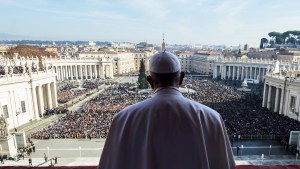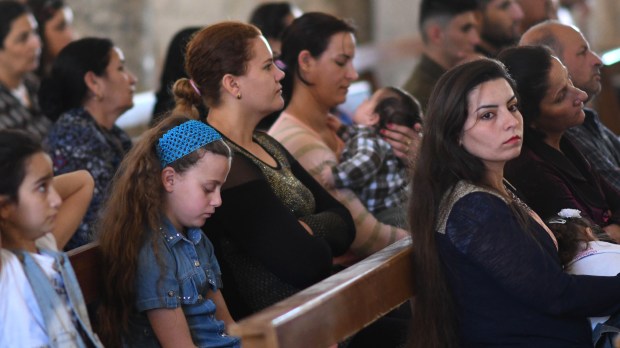Does it sometimes happen that the part of Mass when the ushers start to pass the baskets, the cantor or choir gets a song going, the congregation sits after the long standing spell of the creed and the Prayers of the Faithful, and parents settle the kids … and it all feels somehow like an “intermission?” As if Act I has finished and Act II is about to begin and the mind is supposed to take a break …
If that’s what the offertory feels like, then Pope Francis today is calling you to get to the profound depths of what this part of the Mass is actually about.
Continuing with his audience series on the Mass, with step-by-step explanations of each part, the Holy Father today turned to the start of the Eucharistic liturgy.
He first noted the role of the altar and it’s relation to the cross, saying that the cross was the “first Christian altar … where the first sacrifice was made.”
Francis then pointed out how the Church “has arranged the Eucharistic Liturgy in moments that correspond to the words and gestures made by [Christ] on the eve of His Passion.”
“Thus,” he said, “in the preparation of the gifts, bread and wine are brought to the altar, that is, the elements that Christ took in His hands.”

Read more:
Bishop Barron: What is happening at Mass?
Francis said it’s good that the faithful bring up the bread and wine, “because they signify the spiritual offering of the Church gathered there for the Eucharist.”
He noted how in the times of the early Christians, this offering of bread and wine was made from the faithful’s own store. Though this is no longer the case, “nevertheless the rite of carrying up the offerings still retains its force and its spiritual significance,” he said.
“Therefore, in the signs of bread and wine, the faithful people place their offering in the hands of the priest, who lays it on the altar or table of the Lord, ‘which is the centre of the whole Liturgy of the Eucharist.’ That is, the center of the Mass is the altar, and the altar is Christ; we must always look at the altar, which is the center of the Mass.”
Thus in this presentation of the gifts, in this offering, the faithful “offer their commitment to make of themselves, obedient to the divine Word, a ‘sacrifice pleasing to God the Father Almighty,’ ‘for the good of all His holy Church.’ Thus ‘the lives of the faithful, their praise, sufferings, prayer, and work, are united with those of Christ and with His total offering, and so acquire a new value.'”

Read more:
How many of the most-suffering regions of the world can you name?
Little things
Francis recognized that of course, what we can offer to the Lord, is something small, “but Christ needs this little that we give,” he said.
“He asks little of us, the Lord, and He gives us much. He asks little. He asks us, in ordinary life, for good will; He asks us for an open heart; He asks us for the desire to be better, to welcome Him, He Who offers Himself to us in the Eucharist; He asks us for these symbolic offerings that then become His body and His blood.”
The Holy Father said that the incense is then an image of this “oblative moment of prayer.”
Hence, “there is the altar, which is Christ, but always with reference to the first altar, which is the Cross, and on the altar that is Christ, we bring our small gifts, the bread and the wine, which will then become great: Jesus Himself Who gives life to us.”
The Successor of Peter noted how all of this is expressed in the offertory prayer, as the priest asks God to accept these gifts from the Church, “invoking the fruit of the wonderful exchange between our poverty and His wealth.”
“In the bread and in the wine we present to Him the offering of our life, so that it may be transformed by the Holy Spirit into the sacrifice of Christ and become with Him the single spiritual offering pleasing to the Father,” Francis said.
“The spirituality of the gift of oneself, that this moment of the Mass teaches us, can illuminate our days, our relationships with others, the things we do, and the sufferings we encounter, helping us to build the earthly city in the light of the Gospel,” he concluded.

Read more:
“Offering it up”: Is that still a thing?
Read the full text here.
And check out the previous catecheses on the Mass in this Wednesday audience series:
Why is Sunday Mass important, anyway? The pope explains
The Mass isn’t a show, says pope, chiding those who take cell phone pictures during liturgy
Pope Francis: Why we should go to Mass on Sundays and not be slaves to work
This is the highest and most sublime prayer, says pope
Don’t show up late for Mass, pope says
Shhhh! Why Pope Francis wants you to stop talking during Mass
Want to have a direct conversation with God? Francis explains how
Do you need to ask God for something? Francis explains the moment of Mass to do it

